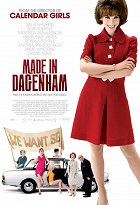Directed by:
Nigel ColeScreenplay:
William IvoryCinematography:
John de BormanComposer:
David ArnoldCast:
Sally Hawkins, Andrea Riseborough, Jaime Winstone, Nicola Duffett, Geraldine James, Bob Hoskins, Daniel Mays, Roger Lloyd Pack, Phil Cornwell, Robbie Kay (more)VOD (2)
Plots(1)
Based on a true story, Made in Dagenham portrays a decisive moment in that decade of upheaval, when the fight for equal rights and pay was led - unexpectedly - by ordinary working-class women with one foot in the kitchen, one foot on the factory floor, and ears glued to the pop coming over the radio and telly from far-off London (19 kilometers and a world away). It‘s a vintage-girl power tale.
Rita O‘Grady (Sally Hawkins, who played the tirelessly cheery heroine of Happy- Go-Lucky) is a young married mother, one of 187 women who work for the Ford Motor Company, the region‘s principal employer. Unlike their male counterparts in the automaker‘s gleaming new main facility, the women toil in a decrepit old 1920s plant with a leaky roof, pigeons flying overhead, and stifling sweatshop conditions in summer. Despite their highly specialized work sewing car seat upholstery, the women are classified as unskilled labor and paid a fraction of the men‘s pay. After all, it‘s still a world where husbands - like Rita‘s man Eddie (Danny Mays) - are the principal breadwinners, and women are the backbone of the home and family. Their work and wages are secondary.
(Transmission Films)
Reviews (4)
To compare what was happening in Czechoslovakia in 1968 with what they were dealing with in England is, in my opinion, complete nonsense. In almost every era (unfortunately, including the current one), there has been an armed conflict somewhere in the world in which tens of thousands of people have died, which was not the case in Czechoslovakia at the time. Every country has its historical traumas and its heroes. Am I supposed to give higher ratings only to films with serious subject matter, and what exactly is the measure of seriousness? Not to mention the fact that the pay inequality between men and women is still one of the most pressing problems in society. From what I've read, these comparative comments were mostly written by men who couldn't care less then, and may not care now. It took enormous courage to strike in 1968 for something like this, and, incredibly, the Ford seamstresses never gave up and finally got their way. The successful retro film Made in Dagenham tells the story with lightness and insight. I can't help but cheer for the fragile Sally Hawkins as she suddenly becomes a leader in the fight for women's equality.
()
British social comedy has deep roots and a long-standing tradition that transforms into remarkable artistry. The British can portray historical events and social processes entertainingly, captivating the viewer with subtle irony, clever humor, and witty imaginative scenes where other cinema would rely on emotional conflicts, pathos, and tragedy. Made in Dagenham depicts one of the crucial conflicts that took place during the so-called second wave of the women's liberation movement. The protest of the factory seamstresses from the Ford plant evolved into a fight for women's equality in terms of wages and working conditions, ultimately leading to a change in British legislation and gaining attention worldwide. The actions of a few dozen women were able to transform the social atmosphere and change established patterns of thinking on a broad scale. Overall impression: 90%.
()
"Everyone out!" A charming, colorful retro drama about the fact that rights are not a privilege, lightened in the way only the British can lighten dramas. All the roles without exception are well cast (but I especially like Sally Hawkins), it is written and filmed with ease and the idea is - God forbid - still relevant. I recommend it to everyone.
()
I will never agree with the notion that female lumberjacks or miners can be just as efficient as men. Don’t blame me. It's the fault of Mother Nature who, contrary to the views of the contemporary degenerate society, came with the concept of two sexes (yes, even the hermaphrodite earthworm confirms my view) for a reason. For example, it is dangerous for women to lift heavy loads, but on the other hand, they can survive childbirth, which I don't think the vast majority of men could survive, even if they hypothetically had the necessary equipment. However, concerning the issue of equal pay for the same amount of work, I am clearly a feminist. If two people are doing identical work, they should get the same money regardless of what’s in their underwear. Thus, I didn’t find the film offensive at all, I quite enjoyed it, and it reinforced my view that some strategies work the same way every time and everywhere. We had a union at my former job, too. The leadership was always able to agree with the employer on the new collective bargaining agreement. Sure, it was somewhat unfriendly to us employees, but our union leaders could go on vacation to an exotic country. By that I mean that the film was like real life. The only thing that spoiled it for me was the attempt to convince me that Sally Hawkins could borrow Rosamund Pike's dress and look great in it. That’s stretching it a bit too far. Oh, and while I'm at it; Sally Hawkins gave a very decent performance and looked completely different than usual. I never thought I’d say this, but she looked stunning. / Lesson learned: Collective bargaining is a joyful activity.
()

